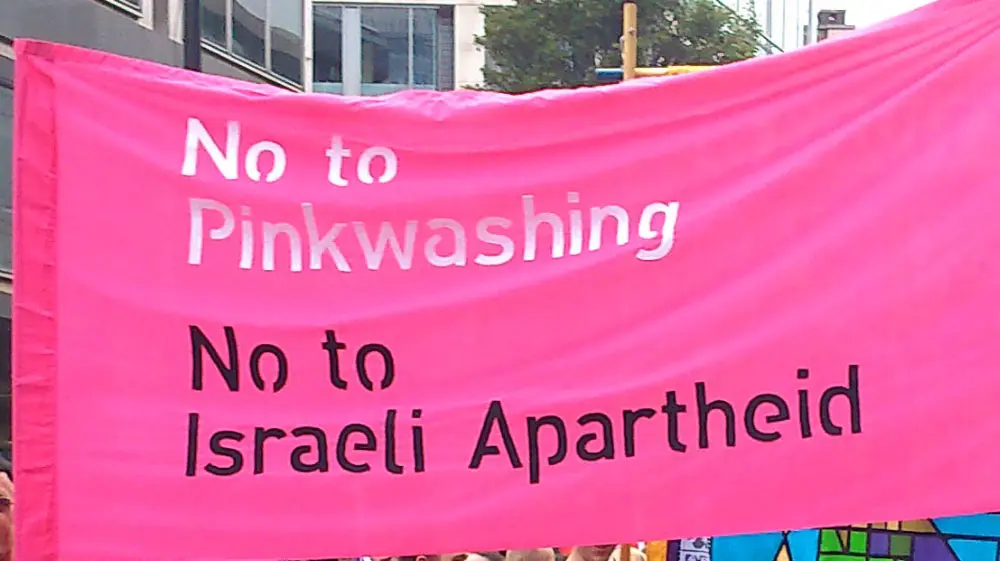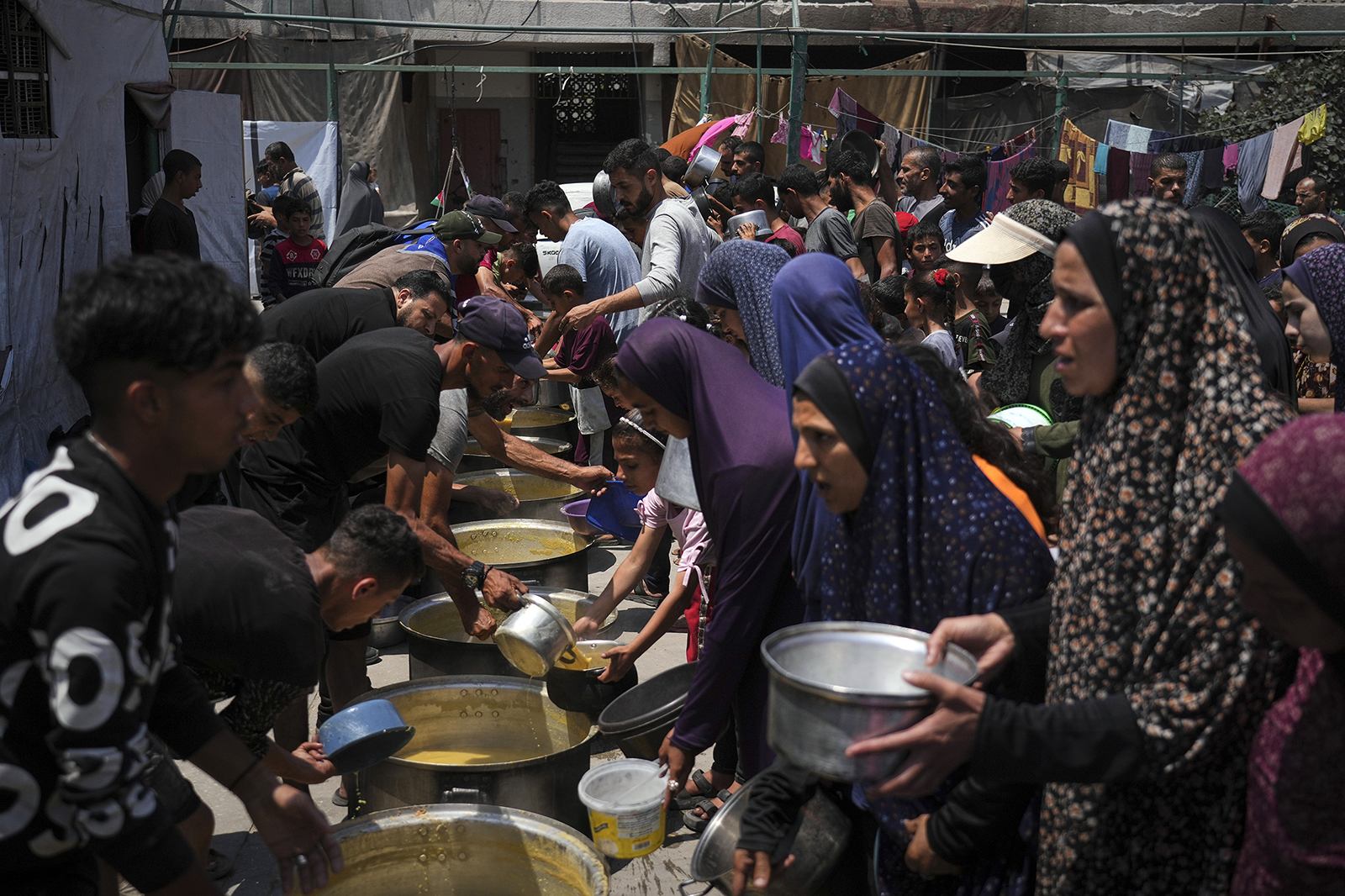- Pinkwashing
- Corinne E. Blackmer (bio)
INTRODUCTION
WHEN USED IN RELATION TO THE ISRAELI-PALESTINIAN CONFLICT, the word “pinkwashing” refers to Israel’s putatively dishonest abuse of its sterling record on LGBT human rights to conceal or “whitewash” its struggles with the Palestinians. Alleged to constitute an invidious “cover up”, pinkwashing actually represents a term of art deployed to deceive and fabricate fallacious arguments about the Israeli-Palestinian conflict. It comprises part of the larger strategy of delegitimization of Israel by the Boycott, Divestment, and Sanctions (BDS) movement, which aims to isolate, de-normalize and, eventually, extirpate Israel as a democratic Jewish State. Despite the deceptive misuse of this term in this context, however, the word originated in other loci where it had different—as well as politically legitimate and rhetorically lucid—meanings.
HISTORY OF THE TERM PINKWASHING
The portmanteau compound term pinkwashing derives from the seventeenth century verb to whitewash, which means to hide crimes and vices, or to exonerate through biased presentation of evidence. The Nazis forced gay male concentration camp inmates to wear inverted pink triangles to shame them for their “inverse” gender identification. Subsequently, in the LGBT activist ACT-UP movement, the pink triangle was repurposed to symbolize political resistance to homophobia and the plight of HIV+ people and those living with AIDS.1
In the 1980s, the now iconic pink ribbon logo became a form of so-called “cause marketing” that companies used to advertise their support for breast cancer survivors, victims, and charities. These logos became ideal means to promote products and sell merchandise. However, in a classic case of false advertising, research revealed that many products sold by these companies contained carcinogenic ingredients linked with the increased risk of [End Page 171] breast and other forms of cancer. In addition, the focus on mammograms, prevention, and “the cure” ignored environmental factors and the fact that poor women of color suffered disproportionately from breast cancer. Accordingly, in 1985, the organization Breast Cancer Action (BCA) coined the term “pinkwashing” to characterize this fraudulent and deceptive form of cause marketing.2 In 2002, BCA inaugurated its Think Before You Pink®3 campaign as an impassioned feminist protest against the indiscriminate and disingenuous abuse of pink ribbon logos to turn profits and, according to Cary Nelson, “hid[e] the ways they are actually contributing to cancer through their manufacturing processes”.4
You may be interested
As applied to anti-Israel movements, the Jewish American lesbian BDS activist, writer, and academic Sarah Schulman claims that the term “pinkwashing” emerged informally in the United States in 2010 as a nonce blending of whitewashing and “greenwashing”, or the marketing of products on the pretense that they were environmentally friendly.5 However, according to Aeyal Gross, Associate Professor of Law at Tel-Aviv University, the pinkwashing moniker actually originated in Israel in 2001 when leftwing queer activists created the group Black Laundry (Kvisa Shchora in Hebrew) to protest the Israeli Defense Forces’ crackdown on Palestinians following the Second Intifada. After long struggles for LGBT equality in Israel—often against the determined opposition from the government and Orthodox Judaism—the right-wing government of Benjamin Netanyahu cynically appropriated LGBT rights to advance its own agendas against Iran and the Palestinian Territories at the United Nations.6 He presented Israel as a gay-friendly, progressive, democratic country that protected human rights, as opposed to other benighted and homophobic Middle Eastern nations.7 Although the claims he made were accurate, and he therefore did not engage in pinkwashing, Netanyahu hypocritically supports parties and organizations abroad (particularly in the United States) that discriminate against LGBT people. Therefore, as Gross asserts, “the term Pinkwashing is not very successful. It causes people to misunderstand the situation,” because unlike the use of the word Greenwashing to describe false environmental claims, Israel has had real LGBT rights advances.8
BDS activists not only failed to make such crucial distinctions but also conflated LGBT Israelis with their government and denied the “real LGBT rights advances (emphasis mine)” made in Israel, which negate the premises of pinkwashing and, in the case of the pink logo, “cause marketing” for breast cancer, both of which rest on fraudulent claims.
From CODEPINK:
One of the most toxic forms of this “pinkwashing”—using acceptance of queer folks to provide cover for racist violence—is practised by our greatest ally in the region, Israel. The Israeli government has a history of leveraging queer acceptance to provide cover for their occupation of Palestine. When in August the Palestinian Authority banned the West Bank activities of the Palestinian group alQaws, a group dedicated to sexual and gender diversity in Palestinian society, it was another excuse for Israeli media outlets to condemn the PA’s homophobia. As a result, Israeli politicians and pro-Israel factions in the US have been using it as a talking point to frame the occupation of the West Bank and the siege of Gaza (pushing Gaza into being uninhabitable by 2020) as a part of protecting queer folks, and more broadly Western values.
Israel has a long history of using the PA’s homophobia to rewrite the occupation as a defensive move, through a marketing strategy that appeals to racist and colonial notions framing Palestinians and Muslims as inherently backwards while white, Western Israel is presented as inherently enlightened. This purposefully ignores the long history of homophobia in white, Judeo-Christian communities and the existence of the queer Palestinian community. Queer Palestinian organizations call for resistance to homophobia and the occupation, not as contradictory social movements, but as an ideologically consistent framework to liberate all Palestinians. Israel can’t claim to stand for the liberation of queer Palestinians while excluding them due to their race.
Beyond being a bad model for queer liberation, Israeli pinkwashing is a distraction from the fact that Israel’s government has not given queer Israelis equal treatment. Having a pride parade for gay Israeli Jews uses queerness as a visible spectacle to distract from their racist policies, all while homophobic policies still affect queer Israelis. Gay conversion therapy is legal in Israel (and recently espoused by the current education minister) by both licensed and non-licensed therapists. LGBT couples are excluded from marriage proceedings in Israel and the state-sponsored surrogacy programs that straight Israelis enjoy.
Citation
MLA
Blackmer, Corinne E. “Pinkwashing.” Israel Studies, vol. 24 no. 2, 2019, p. 171-181. Project MUSE, https://doi.org/10.2979/israelstudies.24.2.14.
APA
Blackmer, C.E. (2019). Pinkwashing. Israel Studies 24(2), 171-181. https://doi.org/10.2979/israelstudies.24.2.14.
Chicago
Blackmer, Corinne E. “Pinkwashing.” Israel Studies 24, no. 2 (2019): 171-181. https://doi.org/10.2979/israelstudies.24.2.14.
Endnote
TY – JOUR T1 – Pinkwashing A1 – Blackmer, Corinne E. JF – Israel Studies VL – 24 IS – 2 SP – 171 EP – 181 PY – 2019 PB – Indiana University Press SN – 1527-201x UR – https://muse.jhu.edu/pub/3/article/720059 N1 – Volume 24, Number 2, Summer 2019 ER –
Always review your references for accuracy and make any necessary corrections before using. Pay special attention to personal names, capitalization, and dates. Consult your library for more information on citing sources.








